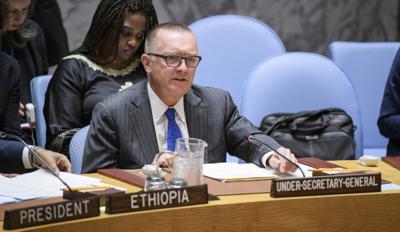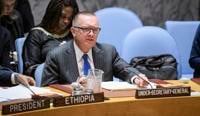
Jeffrey Feltman attends a UN Security Council Meeting in 2017.
Angelo State University’s CJ Davidson Conference Center became the setting for a discussion on international diplomacy on Feb. 21, featuring Jeffrey Feltman. He presented a lecture titled “Shaping Tomorrow: The Israeli-Palestinian Conflict, the U.S. Role, and the Prospects for Peace in the Broader Middle East.” Feltman delved into the complex dynamics of one of the world's most enduring conflicts as part of the ASU College of Arts and Humanities’ initiative to deepen the academic community's understanding of global peace processes. The event
Addressing the audience, Feltman remarked on the increasing difficulties in achieving peace in the Middle East. "It’s always been tough, but I’ve never seen it as tough as it is now," Feltman said. His background, marked by efforts to foster dialogue and mediate conflicts, provided the backdrop for a lecture that explored the historical and current complexities of the Israeli-Palestinian conflict. Feltman acknowledged the topic's sensitive nature, noting, "Any summary of the Israeli-Palestinian conflict will result in controversy."
The lecture offered a comprehensive overview of the conflict's origins, from the early 20th century through the British Mandate era and the United Nations Partition Plan, to the subsequent decades of negotiations and confrontations. Feltman critically examined both the achievements and failures of past peace processes, including the Oslo Accords and various U.S. administration initiatives.
A key theme of Feltman's address was the identification of obstacles to peace, including the expansion of Israeli settlements into territories that Palestinians consider crucial for their statehood. He also highlighted the intricate nature of diplomatic efforts in the region and shed light on the role of international actors, revealing, "The Biden administration is playing a bit of 3D chess, working with Egypt and other countries to try to get hostages released.”
The call to action for a renewed commitment to the peace process underscored the lecture, posing the question, "How can we get a two-state solution to end this crisis?" Feltman's advocacy for a concerted effort toward peace resonated with the attendees, while also emphasizing the importance of understanding the nuances of global conflicts and the role of diplomacy.
The event served as an educational platform and highlighted Angelo State University's dedication to offering its community a comprehensive global perspective and insights into potential careers in foreign service and international relations.
Jeffrey Feltman's discussion at ASU illuminated not just the complexities of the Israeli-Palestinian conflict, but also celebrated his notable career in diplomacy and conflict resolution. His work as a former U.S. special envoy for the Horn of Africa and under-secretary-general for political affairs at the United Nations, a senior fellow at the United Nations Foundation and the Asia Society Policy Institute and his current roles at the Brookings Institution and the American Academy in Berlin have positioned him as a pivotal figure in international conflict mediation, reflecting his significant contributions to fostering international peace and understanding.
Through this extensive background, Feltman has emerged as a leading voice in the dialogue on peace and security. His achievements, underscored by numerous awards and a deep commitment to global diplomacy, offer valuable lessons in the persistence, empathy and strategic thinking required to navigate the challenges of international relations and conflict resolution in today's polarized world.



(0) comments
Welcome to the discussion.
Log In
Keep it Clean. Please avoid obscene, vulgar, lewd, racist or sexually-oriented language.
PLEASE TURN OFF YOUR CAPS LOCK.
Don't Threaten. Threats of harming another person will not be tolerated.
Be Truthful. Don't knowingly lie about anyone or anything.
Be Nice. No racism, sexism or any sort of -ism that is degrading to another person.
Be Proactive. Use the 'Report' link on each comment to let us know of abusive posts.
Share with Us. We'd love to hear eyewitness accounts, the history behind an article.
Any infractions against the above rules will result in comments not being published.